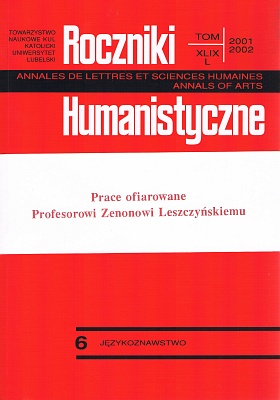O kilku zagadnieniach związanych z językiem Biblii
Abstrakt
The paper seeks to present and verify several questions dealing with the linguistic problems of the contemporary translations of the Bible. Translators usually speak about these questions. They have many times been mentioned in linguistic studies, especially those about the religious language, which can be reduced to the following points: setting in opposition faithfulness of the text and its comprehensibility, faithful translation to interpretation, concern about the beauty of the language, the need for the “protection” of theology or non-linguistic specificity of the text at the cost of its communicativeness.
The paper draws on to the well-known and accepted canons of translation (R. Ingarden's conception; Polish biblical theologians and translators of the Bible). From the linguistic point of view, the most interesting is translators' attitude toward the language of the present times.
Conclusions:
a) One should distinguish between faithfulness in the philological sense and faithfulness in the religious sense. Referring to the tradition of translation in accord with the doctrine and teaching of the Church is justified, whereas referring to the linguistic tradition is in contradiction with the postulate to update the Bible.
b) It is difficult to explain the expression “the beauty of the language.” Usually, it is understood as reference to Wujek's language. One can say that it is a particular kind of the interpretation of the text.
c) In the remarks about the language the distance towards the language of the present times is often signalled very clearly. One can even claim that it is synonymous to the colloquial language understood as a careless language. The question remains open what the contemporary language means. This is, however, a question of deliberate conception of the translation of the Bible.
d) Attempts to go beyond the frameworks defined by translator's tradition are made, and that means that it is possible to translate the Bible into the contemporary Polish language.
Copyright (c) 2002 Roczniki Humanistyczne

Utwór dostępny jest na licencji Creative Commons Uznanie autorstwa – Użycie niekomercyjne – Bez utworów zależnych 4.0 Międzynarodowe.





